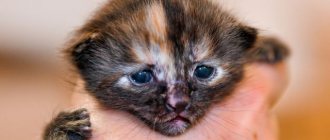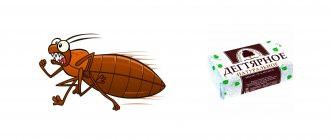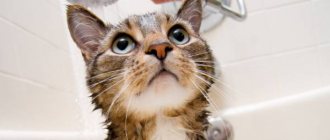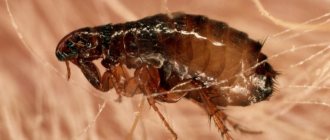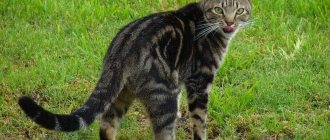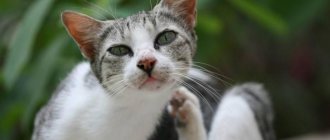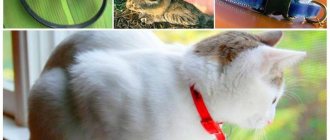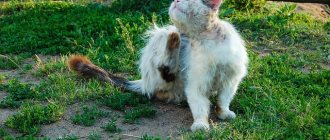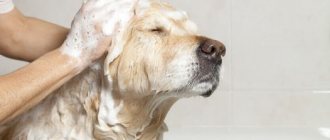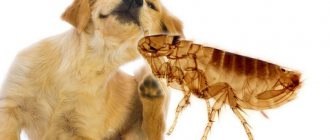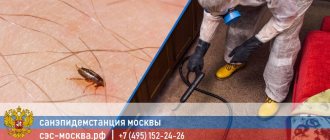There are many ways to remove fleas from a pregnant cat without harming the animal or future offspring. To eliminate parasites, you can use gentle chemicals, some folk remedies and mechanical methods of removing insects.
Fleas in pregnant cats are a very unpleasant and dangerous phenomenon.
Symptoms of fleas in a pregnant cat and methods of infection
More often, fleas appear in cats that are regularly outdoors. Parasites live for a long time without a host, but when a suitable animal passes by, they tend to jump on it. In addition, contact between pets contributes to the spread of parasites.
Fleas can also appear in cats that do not leave the apartment. Adults and their eggs can be carried by homeowners on clothes and shoes. Infection is also possible when visiting places with large concentrations of animals, incl. beauty salons, veterinary clinics, etc. Parasites multiply rapidly.
After a short time, cats develop characteristic symptoms of the presence of fleas:
- itching;
- restless behavior;
- acute desire to itch;
- red dots on the skin.
Cats experience itching and a strong desire to scratch.
When examining a cat's fur under a magnifying glass, you can identify living parasites and black lumps that are waste products of pests. Often the pet becomes irritable. In especially severe cases, severe scratching appears on the cat’s skin. Hair may fall out.
Danger of parasites
It is extremely important to remove fleas from a pregnant cat as quickly as possible, as the parasites can pose a particular danger to newborn kittens, who become infected from the mother while nursing.
Fleas are carriers of the following infectious diseases:
- brucellosis;
- rickettsiosis;
- panleukopenia;
- different types of typhus;
- anthrax;
- leprosy;
- plague;
- helminthiasis.
Fleas are carriers of diseases.
Adult cats are immune to many of these pathologies, but for kittens they are extremely dangerous. In addition, parasite bites often cause the development of allergic dermatitis in newborn animals. Constant loss of blood leads to the fact that young animals grow slowly. Signs of anemia may appear.
The animal's body weakens and becomes more susceptible to other infectious diseases. The situation is complicated by the fact that newborn kittens cannot be treated even with gentle antiparasitic agents.
The body of a young animal may not be able to withstand the toxic load, which will lead to poisoning and death.
Drops from Russian manufacturers
From the entire arsenal of anti-flea drops produced by domestic manufacturers, we can recommend Inspector (from the Ecoprom company) and Biovax for pregnant cats.
The inspector contains two active ingredients - fipronil (10%) and moxidetin (1%). Fipronil is quickly distributed over the surface of the body, having a paralytic effect on ectoparasites, and is practically not absorbed through the skin. Moxidetin, on the contrary, penetrates the blood and is distributed in internal tissues and organs, destroying nematodes and external pests. After treatment, the animal cannot be bathed or washed for 5 days. The anti-flea effect lasts for one and a half months.
Biovax contains exclusively natural components that do not have a toxic effect on the animal’s body in general and pregnancy in particular. The drug has an insecticidal and repellent effect, but less pronounced than its synthetic analogues. Destroys fleas and ticks and repels horseflies, flies, and mosquitoes. After application, the death of ectoparasites occurs within 24 hours, and the animal continues to be protected for a month. The advantages of Biovax drops include their antifungal and antiseptic effect, a positive effect on the condition of the fur, and the elimination of itching and skin irritation. Before applying the drug, it is recommended to conduct a test to determine its tolerance to animals. It is enough to apply 3-4 drops to the withers and observe the cat’s reaction for half an hour. If there are no side effects, use the rest of the product.
Features of deliverance
A cat's body undergoes major changes during pregnancy. At this time, standard antiparasitic agents can create additional stress and cause deterioration in the condition of the animal and offspring.
Fleas can make your cat's condition worse.
Parasites can be poisoned with compounds that will not enter the pet’s systemic bloodstream and will not harm the process of intrauterine development of kittens. In addition, it is important that no harmful substances remain on the female’s fur after giving birth. Young animals, while searching for nipples and feeding, will ingest small doses of poison, which will lead to severe intoxication.
To treat pregnant cats, it is permissible to use only the most gentle methods possible.
Preventive actions
To avoid infection, you should minimize contact with other pets (especially in cases where there is a high probability of infection of other animals). Pregnant pets should not be taken outside: there the risk of infection is much higher, especially if there is a stray animal nearby.
Your home should be cleaned regularly. You shouldn’t limit yourself to dry; it’s important to do wet at least once a week.
Anti-flea collars can be used for prevention. It is important to consult a veterinarian first. Regular bathing using special shampoos is also recommended. You will have to bathe not only the pregnant woman herself, but also all other pets (if any). Whether it is possible to bathe a pregnant cat depends on its reaction to water. To make the procedure more comfortable, it is allowed to place an uneven rubber mat on which the paws will not slip.
The animal needs regular thorough examination. If bites are noticed and the first symptoms of parasite infection appear, measures should be taken immediately: the fewer fleas, the easier it is to deal with them.
All information posted on the site is provided in accordance with the User Agreement and is not a direct instruction to action. We strongly recommend that before using any product, you must obtain a face-to-face consultation at an accredited veterinary clinic.
Bathing and mechanical removal methods
Parasite eggs and adult fleas do not tolerate water well, so a few baths are often enough to eliminate parasites. To enhance the effect, it is permissible to use gentle shampoos. You can bathe your cat in water whose temperature should be +37°C…+39°C.
The processing process includes the following steps:
- Place a terry cloth on the bottom of a basin or sink, into which the animal can dig its claws.
- Prepare several towels in advance to dry the wool.
- Dilute the shampoo with a small amount of water.
- Place the cat in a basin and wet its fur.
- Shampoo the neck first to prevent fleas from moving onto the head, which should not be moistened.
- Lather the wool thoroughly and leave the foam for 5-7 minutes.
- Rinse the animal's fur under running water.
Bathing is an effective method of getting rid of fleas.
The method can only be used if the cat is accustomed to water procedures. If the animal previously struggled and clearly did not enjoy getting its fur wet, this method cannot be used.
The procedure will be very stressful for the cat, which will negatively affect both its health and the development of the kittens.
Brushes and combs are in most cases ineffective for flea control. These insects are jumping, so it is almost impossible to eliminate them all by combing. Some owners catch parasites with their own hands, but this method is dangerous because... may cause transmission of infections to humans.
Treatment of kittens
Kittens have a rather weak immune system and are much more susceptible to all the symptoms of the disease. The consequence of flea bites is the appearance of anemia, and in severe cases, death is possible.
You should protect your cat from flea infestations by taking preventative measures.
- Most drugs are prohibited for use in kittens. Treating them with strong agents intended for treating adult cats is strictly prohibited. The most gentle and effective method for controlling fleas at home is the mechanical method of combing out fleas using special combs. This method is quite labor-intensive, but is best suited for kittens.
- Another effective and approved method for removing fleas from children is the use of proven and safe Frontline or Stronghold shampoos.
- It is allowed to combine treatment of kittens against ectoparasites with the use of anthelmintic drugs.
- A very effective and safe remedy is a self-prepared composition of 150 ml of inexpensive shampoo for kittens with an ampoule of “Neostomazan”.
What tools can be used
Not all products sold in veterinary pharmacies and pet stores can be used to eliminate fleas from the fur of a pregnant cat. However, there are still gentle drugs that, if used correctly, will not harm the animal and offspring.
Collars
It is better to consult a veterinarian before purchasing a collar. The specialist will advise the safest option. Products from the Bars and Beaphar brands are considered the least toxic. After eliminating the parasites, you need to interrupt the contact of the product containing the insecticide with the cat’s skin.
Collars are used to prevent infection.
To prevent re-infection, you can use a bio-collar soaked in essential oil:
- lavender;
- carnations;
- bergamot;
- eucalyptus, etc.
An insecticidal collar should not be put on a nursing cat, as kittens can chew it and get poisoned when playing.
Drops
Some manufacturers produce drops designed to eliminate fleas in pregnant and lactating cats. They are low-toxic and create an “umbrella” effect, destroying living parasites and preventing re-infection.
Recommended products include the following brands:
- Frontline Combo. Drops from this company contain S-methoprene and fipronil. The area between the shoulder blades is treated with the product so that the animal cannot lick it off. The drug has a prolonged effect.
- Advantage 40. The active ingredient in drops from this manufacturer is imidacloprid. The product protects both cats and kittens. The composition is applied to the withers.
- Beaphar. The drops contain an extract of the neem tree. They are effective not only against fleas, but also against ticks. This product is safe. The only contraindication for the use of the composition is the animal’s allergy to the active substance.
The drops are designed to eliminate fleas.
Spray
Some brands have already launched veterinary medications in the form of sprays that are safe for pregnant cats. These means include:
- GreenFort.
- Animal Play.
- “Phytoelite”.
- "Celandine".
These drugs contain natural active ingredients that do not enter the animal’s systemic bloodstream.
Shampoos
To eliminate fleas from the fur of a pregnant cat, shampoos based on natural ingredients are used. The following drugs have a safe composition:
- Beaphar.
- “Lugovoi”.
- “Doctor Zoo”, etc.
Shampoos are used to get rid of fleas.
Before using shampoo, you need to consult a veterinarian and clarify the safety of the drug for the animal.
Traditional methods of fighting fleas
Home remedies are not very effective in controlling fleas. They are best used to prevent the appearance of parasites.
For processing wool, compositions based on:
- wormwood;
- nettle;
- yarrow;
- lavender;
- tansy, etc.
To repel parasites, you should treat the withers with lavender or nettle essential oil. In addition, it is recommended to use homemade shampoo to combat parasites.
Wormwood is used to process wool.
Cooking steps:
- Rub 50 g of baby soap.
- Add 2 tbsp to the cereal. water.
- Simmer the mixture for 30 minutes until the soap is completely dissolved.
- Add 35 ml of yarrow infusion.
- Remove the mixture from heat and leave in a closed container for 2 hours.
You need to lather the moistened wool with the finished product. Leave the foam for 15 minutes and then rinse off under running warm water.
The treatment is also carried out with a decoction of wormwood. To prepare it, boil 25 g of crushed plant in 0.5 liters of water. The mixture is allowed to cool and the wool is moistened with it. It is advisable to treat the litter with the product.
Veterinarian advice
- Most often, the appearance of fleas on a pet is the result of a violation of basic hygiene rules.
- The flea population is enormous in size and no more than 5% of the total number parasitizes the animal’s body.
- Fleas can infest not only sleeping areas and pet carriers, but also actively breed behind baseboards and in other cracks and seams.
- According to experts, daily use of a vacuum cleaner can reduce the ectoparasite population by almost 50%.
By being patient and armed with our advice, you can alleviate the difficult situation of your pregnant cat and protect her offspring from encountering parasites.
